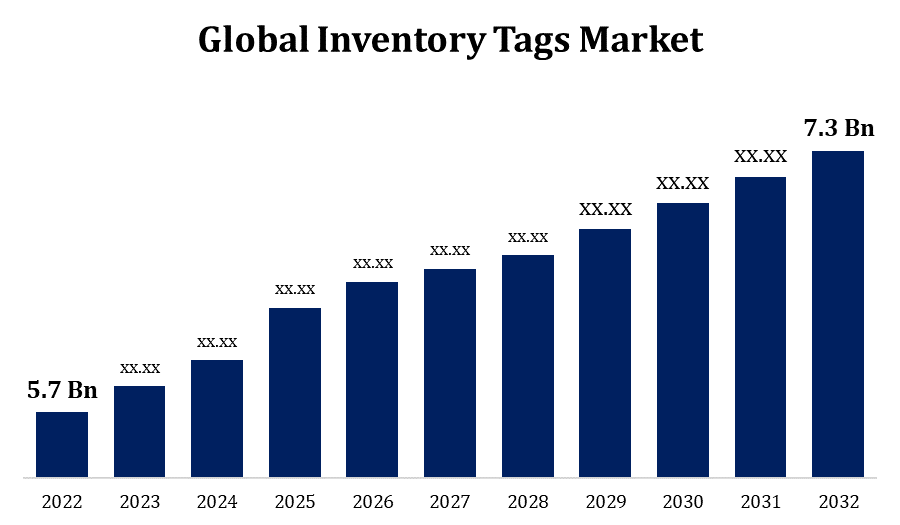Global Inventory Tags Market Size, To Worth USD 7.3 Billion by 2032 | CAGR of 4.2%
Category: Semiconductors & ElectronicsGlobal Inventory Tags Market Size, To worth USD 7.3 Billion by 2032
According to a research Report published by Spherical Insights & Consulting, the Global Inventory Tags Market Size to Grow from USD 5.7 Billion in 2022 to USD 7.3 Billion by 2032, at a Compound Annual Growth Rate (CAGR) of 4.2% during forecast period.

Get more details on this report -
Browse key industry insights spread across 200 pages with 110 Market data tables and figures & charts from the report on the "Global Inventory Tags Market Size By Label Type (Plastic, Paper, Metal), By Printing Technology (Digital Printing, Flexography, Lithography, Screen Printing), By Region, And Segment Forecasts, By Geographic Scope And Forecast." Get Detailed Report Description Here: https://www.sphericalinsights.com/reports/inventory-tags-market
Inventory tags are critical for keeping track of items and controlling supplies. The inventory tag Market Size has expanded to include a wide range of choices, from standard barcode tags to RFID tags. RFID tags provide real-time tracking and automation, whereas barcode tags are affordable and widely utilised. There are also speciality tags for specific businesses, such as durable tags for outdoor use or tamper-evident tags for security. The increasing demand for efficient inventory management, the increased adoption of automation technologies, and the expansion of e-commerce are all factors influencing the growth of the inventory tags market. Demand for improved inventory tagging systems is rising as businesses seek improved supply chain visibility and more efficient operations.
Inventory Tags Market Value Chain Analysis
At this step, businesses develop, manufacture, and modify inventory tags based on client specifications. There are traditional barcode tags, RFID tags, and other specialist tags included. Tags are manufactured and distributed to merchants, distributors, and end users. This stage comprises supervising the logistics of getting the tags to various places throughout the supply chain. Inventory tags are purchased and used by businesses in a variety of industries to satisfy their specific needs. This could range from retail stores using barcode tags to manufacturing factories using RFID tags to track goods in real time. Several organisations combine inventory tags with software solutions to provide full inventory management. At this level, tags are integrated with ERP (Enterprise Resource Planning) systems, WMS (Warehouse Management Systems), or other relevant applications. Tags are attached to products, equipment, or assets to enable tracking. This step comprises putting the tags to use in everyday activities, such as scanning barcode tags at checkouts or employing RFID tags for automatic tracking.
Inventory Tags Market Opportunity Analysis
More complicated technologies may be integrated in inventory tags as technology advances. RFID and IoT (Internet of Things) integration, for example, can provide real-time, granular data on the location and status of inventory goods. There is an opportunity to produce ecologically friendly inventory tags as the emphasis on sustainability grows. This could entail using recycled materials, reducing waste during the manufacturing process, or even investigating biodegradable tags. Developing user-friendly mobile applications that interact with inventory tags can increase accessibility and usability. Mobile-accessible services such as real-time tracking, inventory alerts, and analytics could be included. Offering comprehensive training and support to organisations that use inventory tags might be a lucrative opportunity.
Due to automatic identification, inventory commodities can be tracked in real time throughout the supply chain. This real-time information is essential for businesses to make informed decisions, optimise stock levels, and respond rapidly to changes in demand. Automation of the identification process reduces the need for manual labour in tasks such as data input and inventory counting. This lowers employment costs while allowing employees to focus on more strategic and value-added activities. Automatic identification streamlines numerous operational procedures, from commodities collection and storage to order fulfilment. This efficiency leads to improved overall operational efficiency and reduced lead times. Digital technologies such as the Internet of Things (IoT) and cloud computing work in tandem with automatic identification systems.
Implementing advanced inventory tagging systems, notably RFID technology, can be pricey. Small and medium-sized enterprises may have difficulty implementing these technologies due to budget constraints. With the increased reliance on digital technology, it is vital to secure the security of inventory tag data. Businesses struggle to protect sensitive information from potential cyber attacks and unauthorised access. The lack of common inventory labelling standards may generate interoperability concerns. Different businesses and nations may use different tagging methods, making information transfer across supply chains challenging. Businesses with complex global supply chains may face challenges in standardising inventory tagging practises across borders and following various regulatory standards.
Insights by Label Type
Plastic segment accounted for the largest market share over the forecast period 2023 to 2032. Plastic tags are resistant to water, chemicals, and UV light. They are suitable for industries such as manufacturing, construction, and logistics due to their endurance to a variety of environmental conditions. Plastic tags are typically less expensive than other materials, particularly when durability and endurance are taken into account. They are an interesting option for businesses looking for a stable and cost-effective solution due to their low cost. Plastic tags can be used for a number of different things. Because of their versatility, they can meet a wide range of industry requirements, such as asset tracking, inventory management, and product labelling.
Insights by Printing Technology
Digital Printing segment accounted for the largest market share over the forecast period 2023 to 2032. Digital printing technology allows for high-resolution and detailed printing, allowing for the creation of visually appealing and functional inventory tags. This is especially true for tags that include barcodes, QR codes, and other forms of identification. For short to medium print runs, digital printing is cost effective. Traditional printing procedures may have higher startup costs, making digital printing more cost effective for businesses who require less quantities of personalised tags. Digital printing saves waste by providing on-demand printing. Unlike traditional printing methods, which may require large print runs, digital printing allows businesses to generate only what they need at the time, reducing unnecessary inventory and waste. Digital printing technology ensures colour fidelity and uniformity throughout the print run.
Insights by Region

Get more details on this report -
North America is anticipated to dominate the Inventory Tags Market from 2023 to 2032. RFID technology is increasingly being employed by North American businesses for inventory management. RFID tags enable real-time tracking, which improves supply chain efficiency and accuracy. The continued growth of e-commerce in North America has increased the demand for accurate inventory tracking and management. Inventory tags are essential in the e-commerce business for ensuring accurate order fulfilment and on-time delivery. Businesses in North America are merging inventory tags with IoT and cloud computing technology to collect real-time data and analytics. This integration enhances supply chain understanding and decision-making abilities. North American businesses are heavily investing in technology to update their operations. Modern inventory tagging technology must be applied in order to remain competitive, decrease costs, and improve overall efficiency.
Asia Pacific is witnessing the fastest market growth between 2023 to 2032. As the Asia Pacific area rapidly industrialises and urbanises, the demand for efficient inventory management solutions grows. This trend is propelling the usage of smart inventory tags across a wide range of sectors. The inventory tags market is being propelled by Asia Pacific's burgeoning e-commerce sector, which is being driven by a rising middle class and increasing internet connectivity. Inventory management is crucial for matching online clients' requests. Asia Pacific emerging economies, such as China, India, and Southeast Asian countries, are rapidly adopting technology. One example is the use of enhanced inventory tagging technology to improve supply chain visibility and efficiency. Because Asia Pacific is a cross-border business hub, efficient logistics are essential.
Recent Market Developments
- In May 2022, Vizinex RFID has been bought by HID Global, a global pioneer in trusted identity solutions.
Major players in the market
- Cenveo Inc.
- Smartrac N.V.
- Avery Dennison Corporation
- Hewlett-Packard Company
- Checkpoint Systems Inc.
- Alien Technology Inc.
- Tyco International Plc
- 3M Company
- Brady Corporation
- Zebra Technologies Corporation
Market Segmentation
This study forecasts revenue at global, regional, and country levels from 2023 to 2032.
Inventory Tags Market, Label Type Analysis
- Plastic
- Paper
- Metal
Inventory Tags Market, Printing Technology Analysis
- Digital Printing
- Flexography
- Lithography
- Screen Printing
Inventory Tags Market, Regional Analysis
- North America
- US
- Canada
- Mexico
- Europe
- Germany
- Uk
- France
- Italy
- Spain
- Russia
- Rest of Europe
- Asia Pacific
- China
- Japan
- India
- South Korea
- Australia
- South America
- Brazil
- Argentina
- Colombia
- Middle East & Africa
- UAE
- Saudi Arabia
- South Africa
About the Spherical Insights & Consulting
Spherical Insights & Consulting is a market research and consulting firm which provides actionable market research study, quantitative forecasting and trends analysis provides forward-looking insight especially designed for decision makers and aids ROI.
Which is catering to different industry such as financial sectors, industrial sectors, government organizations, universities, non-profits and corporations. The company's mission is to work with businesses to achieve business objectives and maintain strategic improvements.
CONTACT US:
For More Information on Your Target Market, Please Contact Us Below:
Phone: +1 303 800 4326 (the U.S.)
Phone: +91 90289 24100 (APAC)
Email: inquiry@sphericalinsights.com, sales@sphericalinsights.com
Contact Us: https://www.sphericalinsights.com/contact-us
Need help to buy this report?